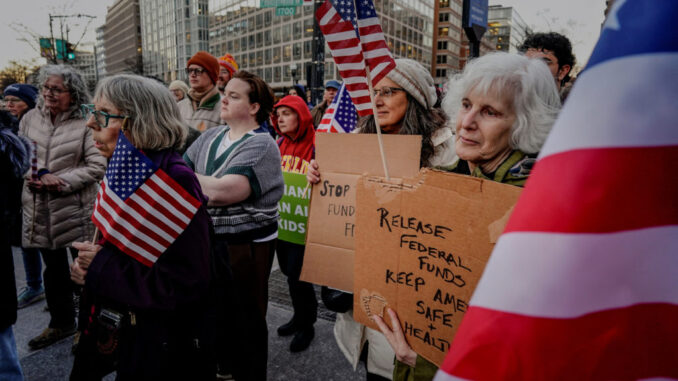
By Key Jones-Ford
On Jan. 27, President Donald Trump issued an executive order that sought to bring a temporary freeze to all federal financial assistance programs.
The two-page memo states that, “Federal agencies must temporarily pause all activities related to obligation or disbursement of all Federal financial assistance, and other relevant agency activities that may be implicated by the executive orders, including, but not limited to, financial assistance for foreign aid, nongovernmental organizations, DEI, woke gender ideology, and the green new deal.”
According to the memo, the goal of the pause was to give the Trump Administration’s Office of Management and Budget (OMB) time to review and determine the best ways to use the funding consistent with President Trump’s priorities. This order follows a string of executive orders passed by President Trump upon his inauguration into his second term. These orders have prioritized the subjects of immigration, U.S. birthright citizenship, trade agreements and policies, and the rescinding of executive orders signed by former President Joseph Biden.
The initial confusion surrounding the exact phrasing of the document concerned U.S. citizens that aid programs such as student financial aid, EBT, and health insurance would be paused. The official website for Federal Student Aid issued a statement clarifying to applicants that their aid would remain unaffected for the time being. “Federal student aid funds (for example, Direct Loans and Pell Grants) were not impacted by the initial guidance, and we continue to award and disburse federal student aid,” the statement reads.
In response, U.S. District Judge Loren L. AliKhan issued a temporary suspension of the freeze on Jan. 28, and the suspension lasted until Monday, Feb. 3. A lawsuit was filed by 23 district attorney generals. According to the official court document, those states are as follows: New York, Illinois, California, Rhode Island, Massachusetts, New Jersey, Arizona, Colorado, Connecticut, Delaware, Washington D.C., Hawai’i, Maine, Maryland, Michigan, Minnesota, Nevada, North Carolina, New Mexico, Oregon, Vermont, Washington, and Wisconsin.
The lawsuit deemed the executive order violates the Administrative Procedure Act, which provides guidelines on how the U.S. government creates, enforces, and reviews agency actions and proposals. “The OMB Directive would permit the federal government to rescind already allocated dollars that have been included in recipient budgets—monies that are otherwise necessary for the Plaintiffs to ensure that their residents have quality healthcare, the protections of law enforcement, the benefit of safe roads, and assistance in the aftermath of natural disasters, among many other key services,” item 2 of the lawsuit reads.
A second memo received by the National Public Radio (NPR) further clarifies the language of the initial memo. An unnamed senior administration official told NPR “that agencies are supposed to review their grants, loans and programs to ensure that they align with the new administration’s priorities.”
On Jan. 29, the White House rescinded the initial memo that was sent out. The Trump Administration still has plans to review use of funds. The White House issued a fact sheet with more information and clarity of their goals. Programs that apply direct aid to US citizens–including Medicare and food stamps–are excluded from the pause. As of Feb. 8, the state of the pause is still uncertain.
This is a developing story. The Vanguard will provide updates as soon as they are made available.
